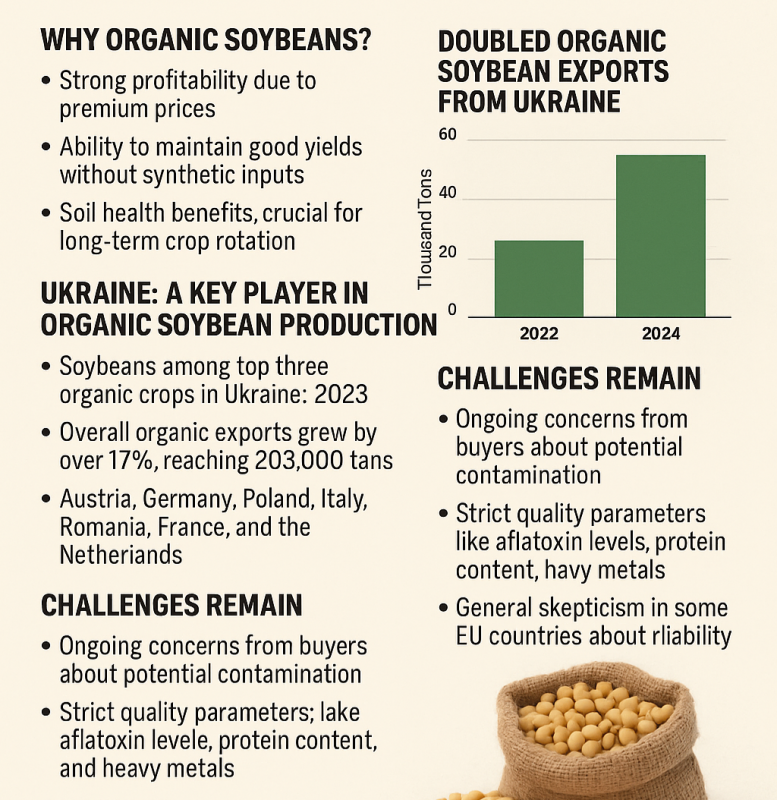Organic Soybeans from Ukraine: Market Trends & Trade Insights

16 / 06 / 2025
Organic Soybean Exports from Ukraine Surge Despite War: Market Trends Under Watch
As market participants, we actively monitor the dynamics of organic agriculture. One standout trend is the rapid growth in Ukrainian organic soybean exports—even amid ongoing conflict and economic hardship.
In recent years, soybean cultivation has gained renewed interest among Ukrainian farmers. With high input costs and export bottlenecks affecting corn, soybeans are increasingly seen as a more cost-effective and resilient alternative. Particularly appealing is the opportunity to serve both local processors and the European organic market.
Organic soybean production has shown exceptional momentum. According to industry data, exports of Ukrainian organic soybeans have more than doubled over the past two years, reaching 52,000 tons. This reflects robust demand from European partners and the appeal of the premium pricing—up to 50–70% above conventional soybean rates.
Why Organic Soybeans?
Strong profitability due to premium prices. Ability to maintain good yields without synthetic inputs. Soil health benefits, crucial for long-term crop rotation. Soybeans now rank among the top three organic crops in Ukraine. In 2023, overall organic exports grew by over 17%, reaching 203,000 tons—thanks in part to the EU’s reduced trade barriers. As a result, Europe continues to play a dominant role in Ukrainian organic trade, with Austria and Germany alone accounting for 70–80% of soybean exports. Other buyers include Poland, Italy, Romania, France, and the Netherlands. Challenges Remain Despite these positive indicators, Ukrainian organic exporters face several obstacles:
- Ongoing concerns from buyers about potential contamination due to the widespread use of agrochemicals in surrounding areas
- Strict quality parameters such as aflatoxin levels, protein content, and heavy metals
General skepticism in some EU countries about the reliability of Ukrainian organic certification. Industry voices, including international buyers, recognize that long-standing Ukrainian organic farms maintain high standards. However, market trust can be jeopardized when new lands are converted to organic, particularly without robust oversight.
Yields and Agronomic Practices The outdated belief that organic yields are significantly lower is increasingly being challenged. While organic farming forbids synthetic fertilizers and pesticides, modern practices like crop inoculation, green manuring, and microbial treatments help maintain competitiveness—even in challenging seasons.
Mechanized weed control is a critical element in organic soybean farming. Experts recommend multiple rounds of harrowing and cultivation, especially in early growth stages where soybeans are less competitive.
Outlook We anticipate sustained growth in the organic soybean sector. To ensure stability and build lasting partnerships, Ukrainian exporters must align with the more stringent private certification standards demanded by European buyers.
While transitioning to organic requires upfront investment—particularly in machinery such as row cultivators and harrows—long-term profitability is achievable. Over a decade, organic soybean production can reduce total costs by up to 30% compared to conventional methods.
At Agro Coop Trade we closely track these developments to provide partners with strategic insight and reliable sourcing options.

